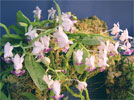|
|
|
|
|
| |
Established Seedlings of
Phalaenopsis parishii 'New Hope' × sib 'Parkside' |
|
| |
|
|
| |
| Number: |
TN3531 |
| Name: |
Phalaenopsis parishii 'New Hope' × sib 'Parkside'
|
| Type: |
sib (What's that?) |
|
Seed Donor: |
Zachary Bittner
|
|
Click to Enlarge

Pod Parent Blooming Plant |
Click to Enlarge

Pod Parent Plant with Capsules |
Click to Enlarge

Pollen Parent Flower |
Click to Enlarge

Pollen Parent Plant with Capsules |
Click to Enlarge

Offspring 'MC4240' Flower |
| Offspring photos are siblings of the plants you would receive. |
|
|
|
| |
Culture Notes from Donor: Parent plants: Temperature range I (60-83°F). Should be mounted on cork and grown under intermediate conditions. Can tolerate drying out for brief periods provided that there is high humidity present. Seems to prefer brighter light and cooler temperatures than most Phalaenopsis species.
Comments: This species as a whole has been reported as being fairly difficult to grow.
These siblings are growing on the same mount.
Pod parent plant: This particular plant is a vigorous grower that occasionally doubles by forming keikis off of the primary growth. Never goes completely deciduous. Fragrant miniature.
Pollen parent plant: Flowers are slightly larger than that if its sibling. Fragrant miniature.
For additional origin/habitat information supplied courtesy of
Charles and Margaret Baker, see further below, near the bottom of this page.
|
Temperatures we attempt to use in the lab & greenhouse:
| For Species: |
|
Spring, Summer, Autumn: days average 80°F, nights 71°F; best fit is Warm-Intermediate 87-64°F
(Source:
Baker's Web OSC) |
| For Species: |
|
Winter: days average 86°F, nights 63°F; best fit is Warm-Intermediate 87-64°F
(Source:
Baker's Web OSC) |
| For Genus: |
|
Spring, Summer, Autumn, Winter: days average 87°F, nights 64°F; best fit is Warm-Intermediate 87-64°F
(
) |
|
About the name...
| Etymology of |
parishii |
|
Named for Charles Samuel Pollock Parish (1822-1897), English missionary and orchid collector, traveled in Burma, discovered many species.
(Source:
Mayr & Schmucker 1998) |
| Etymology of |
Phalaenopsis |
|
From Greek, "phalaina" moth; "-opsis" appearance.
(Source:
Pridgeon 1992) |
| Pronunciation of |
parishii |
|
PAR-ish-ee-eye
(Source:
Hawkes 1978) |
| Pronunciation of |
Phalaenopsis |
|
fail-eh-NOP-sis
(Source:
Pridgeon 1992) |
| Pronunciation of |
Phalaenopsis |
|
fal-eye-NOP-sis
(Source:
Hawkes 1978) |
|
If you would like to direct someone to this web page, please copy and paste this URL into your email:
http://troymeyers.com/d?123531
|
ESTABLISHED SEEDLINGS
of these are not currently available, but we have some maturing in the greenhouse and expect to offer them in the future.
There is 1 item with
1 plant per
item that will be considered for sale later.
Click here to see if we have flasks available.
|
|
|
| |
The origin/habitat information below is supplied courtesy of Charles and Margaret Baker
The following information is based on the name of the plant provided by the donor, and assumes that the name is correct. If the plant has been misidentified, then the following information may not be correct.
This text is copyrighted by the Bakers and may not be reproduced without permission.
ORIGIN/HABITAT: Northeast India, Myanmar (Burma), and Thailand. Plants are
most often found on moss-covered tree branches overhanging streams, where
hot, moist conditions prevail during the growing season. In Myanmar
(Burma), this orchid is found near Moulmein. In Thailand, plants are found
in the northern and western mountains with collections reported near Ban
Me Lamung at 1650 ft. (500 m) and near Kanburi.
More about this information and the Bakers...
|
|
|
| |
|
|
|